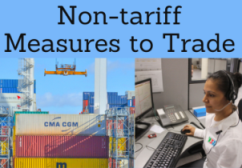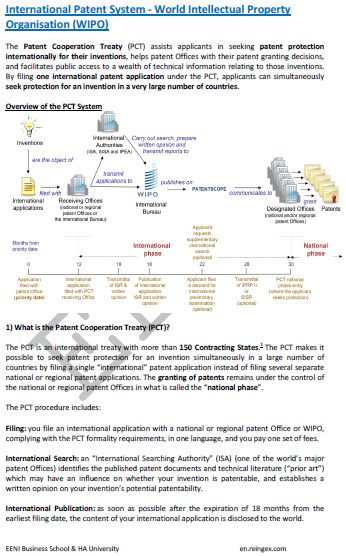Intellectual Property Rights (IPR) WTO

Agreement: Trade-Related Aspects of Intellectual Property Rights (TRIPS, WTO)
- Introduction to the Trade-Related Aspects of Intellectual Property Rights
- Copyright and rights related to the copyright
- Industrial property
- Infringement of the intellectual property rights
- The role of the World Intellectual Property Organization (WIPO)
- Agreement on Trade-Related Aspects of Intellectual Property Rights (TRIPS)
of the WTO
- The Pillars of the TRIPS Agreement
- Other international agreements
- Paris Convention for Protection of Industrial Property (patents, industrial designs, etc.)
- Berne Convention for Protection of Literary and Artistic Works (copyright)
- Case study: Intellectual property rights in the U.S.-Mexico-Canada Agreement (USMCA/NAFTA 2.0)
The objectives of the subject “Trade-Related Aspects of the intellectual property rights” are the following:
- To understand the fundamental concepts related to the Trade-Related Aspects of Intellectual Property Rights
- To know the role of the World Intellectual Property Organization (WIPO) and the different international intellectual property registration systems (Lisbon, The Hague, Madrid...) of the WIPO
- To learn the importance and pillars of the Agreement on Trade-Related Aspects of the intellectual property rights (TRIPS) of the WTO

The Subject “Trade-Related Aspects of Intellectual Property Rights” belongs to the following Online Programs taught by EENI Global Business School:
Courses: Non-tariff Measures, Global Marketing.

Masters: International Business, Foreign Trade and Marketing.
Languages: 
 Derechos de propiedad intelectual
Derechos de propiedad intelectual
 Droits de propriété intellectuelle
Droits de propriété intellectuelle
 Intellectual Property Rights.
Intellectual Property Rights.
Trade-Related Aspects of Intellectual Property Rights.
The Intellectual creations are protected through the intellectual property rights. These might be:
- Copyright and related rights (sheet music, books, software...)
- Industrial property
The industrial property include: trademarks, patents, trade secrets, designs, geographical indications, website domains, database protection...
The main objective of the intellectual property rights is to protect the author, consumers and promote a fair competition in addition to favoring the innovation (inventions). The Intellectual property rights also allow negotiating a payment for use to the owner of the right.
In foreign trade, the intellectual property rights ensure the transfer of technology (licenses, investments abroad, joint-ventures...).
According to the WTO “the protection of intellectual property must contribute to the technical innovation and technology transfer”
The importance of the Agreement on Trade-Related Aspects of Intellectual Property Rights (TRIPS) of the WTO lies in the fact that it allows the incorporation of a whole series of regulations related to the intellectual property in the multilateral trading system.
The TRIPS agreement seeks to standardize the industrial property rights in the member countries of the WTO through the development of international standards of common use.
These minimum agreements on the protection of the intellectual property rights are usually improved and extended in the free trade agreements.
The Agreement on Trade-Related Aspects of Intellectual Property Rights (TRIPS) also defines the mechanisms for resolving the differences between the countries.
The pillars of the Agreement on Trade-Related Aspects of Intellectual Property Rights (TRIPS):
- National treatment
- Most favored nation treatment (MFN)
- Balanced protection
The Paris Convention for Protection of Industrial Property, signed in 1883, includes the protection of utility models, trademarks, trade names, patents, industrial models, unfair competition and geographical indications.
Sample - Trade-Related Aspects of Intellectual Property Rights:


(c) EENI Global Business School (1995-2024)
We do not use cookies
Top of this page



